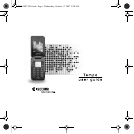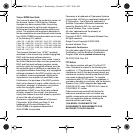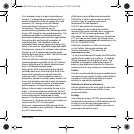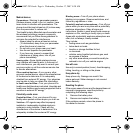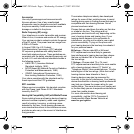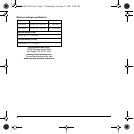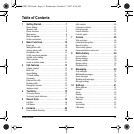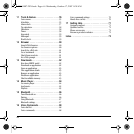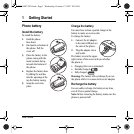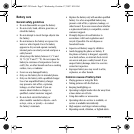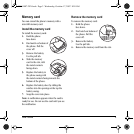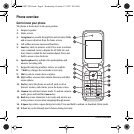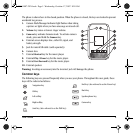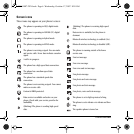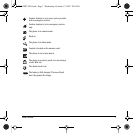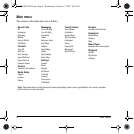
User Guide v
Accessories
Use only Kyocera-approved accessories with
Kyocera phones. Use of any unauthorized
accessories may be dangerous and will invalidate
the phone warranty if said accessories cause
damage or a defect to the phone.
Radio Frequency (RF) energy
Your telephone is a radio transmitter and receiver.
When it is on, it receives and sends out RF energy.
Your service provider’s network controls the power
of the RF signal. This power level can range from
0.006 to 0.6 watts.
In August 1996, the U.S. Federal
Communications Commission (FCC) adopted
RF exposure guidelines with safety levels for
hand-held wireless phones. These guidelines are
consistent with the safety standards previously set
by both U.S. and international standards bodies in
the following reports:
• ANSI C95.1 (American National
Standards Institute, 1992)
• NCRP Report 86 (National Council on Radiation
Protection and Measurements, 1986)
• ICNIRP (International Commission on
Non-Ionizing Radiation Protection, 1996)
Your phone complies with the standards set by
these reports and the FCC guidelines.
E911 mandates
Where service is available, this handset complies
with the Phase I and Phase II E911 Mandates
issued by the FCC.
Hearing Aid Compatibility (HAC) with Mobile Phones
Some mobile phones and hearing devices (hearing
aids and cochlear implants), when used together,
result in buzzing, humming, or whining noises
detected by the user. Some hearing devices are
more immune than others to this interference noise,
and phones also vary in the amount of interference
they generate.
The wireless telephone industry has developed
ratings for some of their mobile phones, to assist
hearing device users in finding phones that may be
compatible with their hearing devices. Not all
phones have been rated.
Phones that are rated have the rating on their box
or a label on the box. The ratings are not
guarantees and results will vary depending on the
user’s hearing device and hearing loss. If your
hearing device happens to be vulnerable to
interference, you may not be able to use a rated
phone successfully. Trying out the phone with
your hearing device is the best way to evaluate it
for your personal needs.
M-Ratings—Phones rated M3 or M4 meet
FCC requirements and are likely to generate
less interference to hearing devices than phones
that are not labeled. M4 is the better/higher of
the two ratings.
T-Ratings—Phones rated T3 or T4 meet
FCC requirements and are likely to be more usable
with a hearing device’s telecoil (“T Switch” or
“Telephone Switch”) than unrated phones. T4 is the
better/higher of the two ratings. (Note that not all
hearing devices have telecoils in them.)
Hearing devices may also be measured for
immunity to this type of interference. Your hearing
device manufacturer or hearing health professional
may help you choose the proper rating for your
mobile phone. The more immune your hearing aid
is, the less likely you are to experience interference
noise from mobile phones.
For more information about hearing aid
compatibility, visit the FCC's Consumer &
Governmental Affairs Bureau Web site at
www.fcc.gov/cgb/dro.
82-G1887-2EN.book Page v Wednesday, October 17, 2007 8:38 AM



